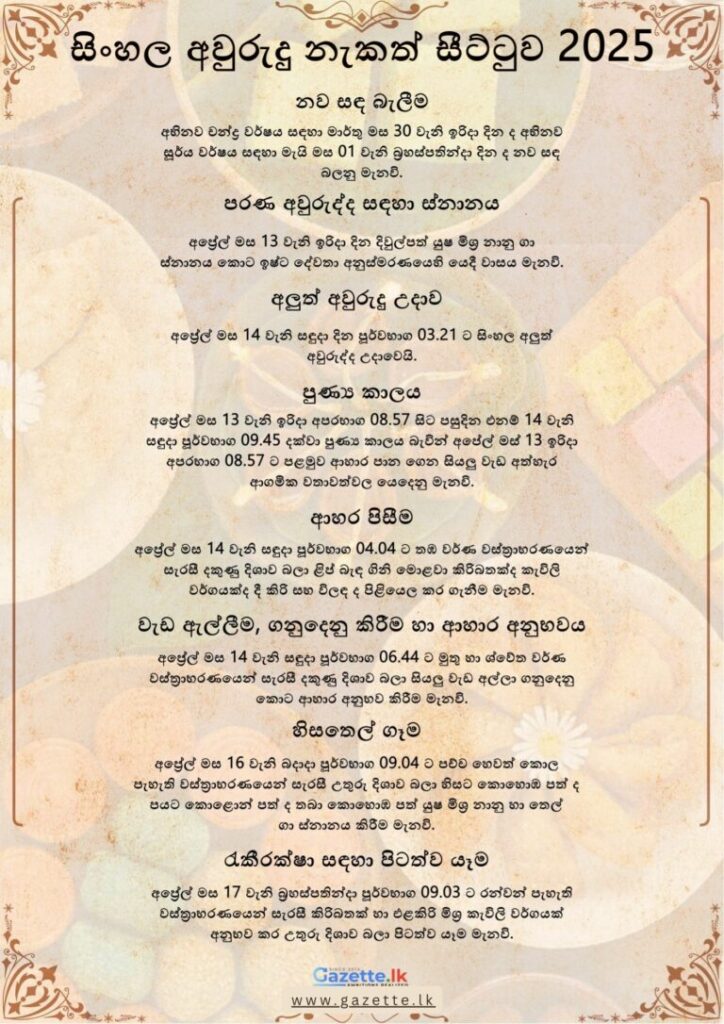The Sinhala and Tamil New Year, known as Avurudu in Sinhala and Puthandu in Tamil, is one of the most significant cultural traditions in Sri Lanka. Celebrated every year in the month of April, this vibrant festival marks the dawn of a new year according to the lunar calendar. It’s a time when communities come together to promote unity, cooperation, and harmony among people of different backgrounds, showcasing the deep cultural heritage of Sri Lanka.
This unique celebration is not just about rituals; it’s also a period filled with joy, laughter, and festivity. From traditional games like kana mutti bindeema (breaking the pot blindfolded) and tug-of-war to delicious feasts featuring kiribath (milk rice), kokis, and other traditional sweets, the New Year festivities are a blend of culture, entertainment, and spirituality.

අවුරුදු සුබ පැතුම්
Observing the New Moon
Date: The chosen days for this observance are Sunday March 30 (Lunar New Year) alongside Thursday May 1 (Solar New Year).
Significance: When the new moon becomes visible it signifies a transformative period during which people should practice reflection and realignment with cosmic forces.
Ritual Bath for the Old Year
- Date: Sunday, April 13
- Ritual: Divul (wood apple) leaves are used in a herbal bath that serves to purify both physical and spiritual elements of the body. The closing ceremonies include religious practices for ending the past year before inviting peace between the old and new.
Dawn of the New Year
- Date & Time: Monday, April 14 at 3:21 AM
- Ritual: As the old year passes, people light oil lamps to mark the auspicious dawn, symbolizing a fresh beginning illuminated by hope and prosperity.
Punya Kalaya (Neutral Period)
- From: Sunday, April 13 at 8:57 PM
- To: Monday, April 14 at 9:45 AM
- Significance: A period of stillness and mindfulness. The first religious portion of the festivities precedes an auspicious period when families gather to work and cook and spend time together.
Preparation of the First Meal
- Time: Monday, April 14 at 4:04 AM
- Dress Code: Copper-colored attire, facing south
- Ritual: Kiribath (milk rice), sweets, and milk boiling mark abundance and togetherness.
First Work & Transactions
- Time: Monday, April 14 at 6:44 AM
- Dress Code: White and pearl-colored clothing, facing south
- Significance: People begin work, handle transactions, and enjoy their first meal of the year — setting a tone of success and stability.
Anointing of Oil
- Date & Time: Wednesday, April 16 at 9:04 AM
- Dress Code: Green, facing north
- Ritual: Herbal oils with kohomba and kolon leaves are used for anointing the head. This ritual is believed to protect and promote good health.
Stepping Out for Prosperity
- Date & Time: Thursday, April 17 at 9:03 AM
- Dress Code: Gold, facing north
- Ritual: After a wholesome meal of kiribath and sweets, people step outside to embark on their first journey of the year — a gesture inviting fortune and positivity.
📥 Download the Full Nakath Schedule PDF:
Click here to download the PDF In English
Click here to download the PDF In Sinhala
Suba Aluth Avuruddak Wewa…! May 2025 arrives with abundant joy to your family members and you. Allow the family fireplace to crackle while milk boils in front of you as your love creates comforting warmth between family members.


